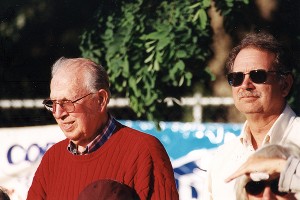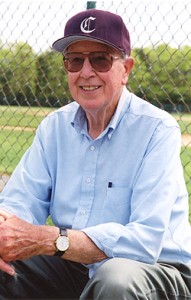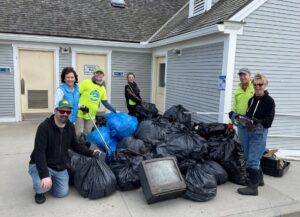I was lost.
My girlfriend – long since, my wife — and I had just moved to Hyannis Port from the Bronx and while my ancestral roots run deep on the Cape, I had no idea where I was or where I was going so I just drove and followed my sixth sense.
I ended up taking a right onto Lowell Avenue and it changed my life forever.
I should have known, after a life in baseball and sports that I couldn’t just grow up and leave it behind. I should have known that fate would push me to this magical place, “Elizabeth Lowell Park, Home of the Cotuit Kettleers.” I immediately asked myself what exactly is a “Kettleer?” It immediately brought me back to my hometown Jones Field in Acton, which was adjacent to the house I grew up in.
This was the last day of the Cape Cod Baseball League season and I had never even been to a Cape League baseball game.
When I got out of my car and fans were filtering into the bleachers, I spotted a sort of interesting, bespectacled man tinkering with a large red ride-on lawnmower, one of those professional, double-decker models. I instinctively walked over and introduced myself and asked if he needed any help. He was the first person I met on the Cape and we immediately forged a friendship that has lasted over 25 years. It took some time for me to realize the great impact he’s had not only on my life, but on so many countless thousands of people, all through the game of baseball and this ineffable, iconic setting. This was “his” place and you could feel it, but he’d never let you believe it, for there are few people on this planet who possess the level of humility and reverence for the game of baseball and human beings that this man has.
Born the second youngest in 1924 to Abraham Mycock and Evelyn G. “Lena” Wordell of Fall River, Arnold Mycock grew up on Riverside Avenue in Pottersville, a sleepy little hamlet of Somerset. He was a three-sport star at Somerset High School and was one of the first athletes inducted into the Somerset High School Athletic Hall of Fame.
A veteran of the US Army Air Corps in World War II, Arnold Mycock moved to Cotuit after the war, joined Barnstable Post 206 American Legion and began what would turn out to be a lifetime fostering the cornerstone Cape League franchise, the Cotuit Kettleers. He served as coach, bullpen catcher, chief groundskeeper, bus driver, general manager, recruiter… the organization grew as he grew.
And it flourished. And it grew. And it prospered. And it became one of if not the most significant, popular and successful enterprises in the Town of Barnstable and the Cape Cod Baseball League. Arnold was one of three men in the early 1960s who re-wrote the Cape League’s core business plan and he helped negotiate its sponsorship and sanction by the NCAA in 1963. It took no discussion in the inaugural phases of the formation of the Cape Cod Baseball League Hall of Fame when his name was brought up for induction in 2000.
I can say with all due sincerity that I’ve never seen him without a smile and it was that smile, fairly recently, that greeted me once again at his humble abode overlooking the Cotuit Highgrounds nine-hole golf course, set amidst the whispering, lofty pines.
It had been, perhaps, two winters since we had last spoken and life’s whirlwind had made me neglect our mutual bond but the harsh winter had me worried about his well-being. Sitting across from him, relaying stories back and forth, the sparkle in his eye seemed to reignite. We talked at length about “The Game” and he rattled off the names of the Post 206 Legion players he had been following in the news. We talked about family and history and Lowell Park and its progress from being, in essence, an open meadow with a home plate and pitcher’s mound in the late 1940s, into the Rockwellesque sanctum of Americana it had grown to represent: the last vestige of a world long gone by.

Arnold Mycock sits watching his Cotuit Kettleers play with Kettleers general manager Bruce Murphy.
Sean Walsh/Capecod.com Sports
It interested me to no end when our discussion turned to family and his deep, New England roots. Arnold’s father, Abraham Mycock (1882-1933) was a matricer (felt binder) in a hat factory in Fall River at the turn of the century and later a loom fixer in a textile mill. He imbued in his four sons and two daughters a sound work ethic intermixed with a handyman’s sense of being able to do “everything.”
His grandfather, Joseph Mycock (1859-1933), was also a loom fixer in a cotton mill in Fall River, and had immigrated to Fall River at the age of nine.
But recollecting nearly a century’s worth of family lore can be overwhelming on an impromptu visit to a man whose life has been a never-ending stream of new names and new faces each summer. Decade upon decade of baseball players by the dozen have walked through his consciousness, tucked away as brief flashes on the cobwebbed shelves of memory. Countless Major League players have put their feet up and chewed the fat in his living room. Most of them owe their careers to this man.
But he would not let you believe it.
I remember sitting on that rusty old red lawnmower sitting in centerfield as I watched him make his “rounds” around the outside of the fence, stooping down to pick up a gum wrapper or a twig, plaid button-down short sleeve shirt tucked in. Maroon Kettleers’ cap firmly affixed, his rotund, loyal companion “Chuck” lumbering behind, baseball in mouth.
Sitting in his armchair in his living room as winter waned outside, the sun setting through his picture window overlooking the ninth fairway, I pictured that image of him walking around the fence at Lowell Park, as he had every single day for 60 years. That’s the memory of the man I am going to one day hold onto the most. That is the image of the dear friend whom I hope will not depart this physical plan anytime soon.
That is the man who gave this wonderful gift – this place, this team, this beloved baseball league — to the entire Cape Cod community through a life of complete sacrifice and selflessness and love, devoid of the darkness that pushes its weight down upon us every day.
— Sean Walsh’s column “One on One” appears on Capecod.com each Friday. To email him, send to [email protected] or follow him on Twitter @coachwalshccbm.
























